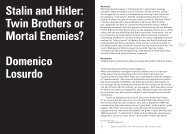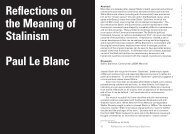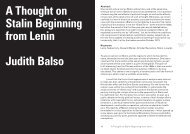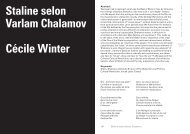adrian
adrian
adrian
- No tags were found...
Create successful ePaper yourself
Turn your PDF publications into a flip-book with our unique Google optimized e-Paper software.
as) the very heart of the first Critique’s analysis of Verstand. Hence,it is firmly circumscribed within the field of phenomenal experienceand its limits as co-constituted by the two faculties of intuition and theunderstanding. Therefore, Hegel’s above disqualification of “subjectiveunderstanding” qua “the act of the self-conscious understanding”strikes at nothing other than the apperceiving activity of synthesizingself-consciousness as per the “Transcendental Deduction” ambivalentlyreferenced four paragraphs earlier in the Science of Logic. Unlike intranscendental idealism, with its subjectivism (and correspondingaversions to realism, naturalism, and materialism), “der Begriff an undfür sich” is as much “non-spiritual” (i.e., asubjectively objective quanatural, substantial, etc.) as it is “spiritual” (i.e., subjective, whetheras individual [self-]consciousness or the socio-historical collectivitiesof “objective spirit”). Moreover, the Notion/Concept (der Begriff) asself-aware thinking subjectivity (i.e., the side of this closer to Pippin’sKant) is explicitly rendered by Hegel here, already anticipating thephilosophical anthropology and psychology of the third volumeof the Encyclopedia on Philosophy of Mind, as emergent vis-à-visnature generally and organic, living beings specifically. 106 This positor anything like it would be inadmissible within the epistemologicalconfines of the Kantian critical-transcendental idealism leaned upon byPippin.As seen, Žižek, both implicitly and explicitly throughout LessThan Nothing, challenges in various ways Pippin’s tendency to situateHegelian subjectivity within the anti-materialist, anti-naturalist, andanti-realist framework of the subjectivism of Kantian transcendentalidealism as grounded in the apperceptive unity of (self-)consciousness.The second paragraph of the preface to Hegel’s 1801 Differenzschriftprovides yet more ample support for opposition (whether Žižekian ornot) to Pippin’s deflationary rapprochement between the Kant of the“Transcendental Deduction” and Hegel (and, with Pippin himself citingthis very same paragraph in support of his Kantianizing interpretation, 107I am opting once again, as with the passage in the Science of Logic’s“Doctrine of the Concept” on the “Transcendental Deduction,” for animmanent-critical line of contestation):The Kantian philosophy needed to have its sprit (Geist)106 Hegel 1986a, p. 185; Hegel 1970d, §376 (pp. 443-445); Hegel 1971, §381 (pp. 8, 13-14), §388-389(pp. 29-31), §391 (pp. 35-36), §412 (pp. 151-152).CRISIS&CRITIQUE#3distinguished from its letter (Buchstaben), and to have itspurely speculative principle lifted out of the remainder thatbelonged to, or could be used for, the arguments of reflection(der räsonierenden Reflexion). In the principle of the deductionof the categories Kant’s philosophy is authentic idealism (echterIdealismus); and it is this principle that Fichte extracted in a purer,stricter form and called the spirit of Kantian philosophy. Thethingsin themselves—which are nothing but an objective expression ofthe empty form of opposition—had been hypostasized anew byKant, and posited as absolute objectivity like the things of thedogmatic philosophers. On the one hand, he made the categoriesinto static, dead pigeonholes of the intellect (Intelligenz); and onthe other hand he made them into the supreme principles capableof nullifying the language that expresses the Absolute itself—e.g., ‘substance’ in Spinoza. Thus he allowed argumentation(negative Räsonieren) to go on replacing philosophy, as before,only more pretentiously than ever under the name of criticalphilosophy. But all this springs at best from the form of theKantian deduction of the categories, not from its principle orspirit (Prinzip oder Geist). Indeed, if we had no part of Kant’sphilosophy but the deduction, the transformation (Verwandlung)of his philosophy [from speculation into reflection] would bealmost incomprehensible. The principle of speculation is theidentity of subject and object (die Identität des Subjekts undObjekts), and this principle is most definitely articulated in thededuction of the forms of the intellect (Verstand). It was Reason(Vernunft) itself that baptized this theory of the intellect. 108Hegel here unambiguously distinguishes between the nonspeculativequa subjective idealist “letter” and the speculative quaabsolute idealist “spirit” of Kant’s “Transcendental Deduction.” Alreadyin 1801, he heavily qualifies his praise of the Kantian transcendentalunity of apperception in the exact same manners he does later in suchtexts as the Science of Logic (with me having cited and unpacked thesesubsequent instances in the course of substantiating my criticismsof Pippin earlier). Moreover, he signals that his post-Kantianism is asublation als Aufhebung, being at least as much “post-” in the senseCRISIS&CRITIQUE#3107 Pippin 1989b, pp. 6, 17, 35; Pippin 1989a, pp. 28-29.108 Hegel 1970a, pp. 9-10; Hegel 1977a, pp. 79-80.400 “Where to Start?: Robert Pippin, Slavoj Žižek...401“Where to Start?: Robert Pippin, Slavoj Žižek...






